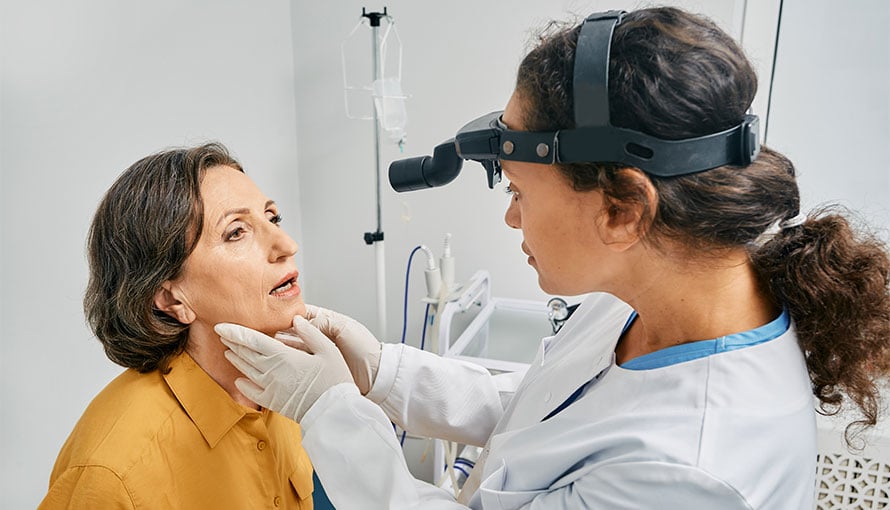Tongue Cancer Diagnosis

Tongue cancer develops in the cells of the tongue, a long muscular organ that extends from the floor of the mouth to the hyoid bone in the middle of the neck. Normally moist and pink, the appearance of the tongue can provide important clues that may point to an underlying medical condition, such as tongue cancer.
In most cases, tongue cancer originates in the thin, flat squamous cells that form the tongue’s mucosal surface. Like all types of cancer, it results from cellular mutations that cause the cells to reproduce uncontrollably. The excess cells then bind together and form tumors.
What causes tongue cancer?
The causes of tongue cancer are not yet well understood by scientists. However, researchers have identified certain risk factors for tongue cancer, including:
- Smoking cigarettes and using other tobacco products
- Excessive consumption of alcoholic beverages
- Human papillomavirus (HPV) infection
- Poor oral hygiene
- Tongue irritation caused by jagged teeth or ill-fitting dentures
When should you see a doctor or dentist for tongue issues?
The tongue plays a key role in chewing, swallowing, speaking and breathing, and this may become readily apparent when tongue pain occurs. Usually, a sore tongue has a visible cause. For instance, a mild burn on the tongue from eating hot food can cause discomfort and redness that linger for up to two weeks. Less often, however, tongue pain is a symptom of a more serious issue, such as tongue cancer.
In general, you should see a medical professional for an oral cancer screening if:
- You have severe or unexplained tongue pain that persists for several days.
- You have a pinkish-red sore on the side of your tongue that does not seem to be healing.
- You see red or dark patches on your tongue.
- You experience tongue pain or itchiness that does not improve within several days.
- You notice an ulcer-like lump on your tongue that bleeds easily if bitten or touched.
- Your tongue bleeds for no apparent reason.
- You have thick white patches on your tongue, gums or inner cheeks that cannot be scraped off (leukoplakia).
- Your mouth feels numb.
- You experience pain when you swallow.
- You have a persistent sore throat.
Either a doctor or a dentist can provide an oral cancer screening. If you need follow-up care after you see a dentist, he or she will likely coordinate your next steps with your doctor.
What to expect during a tongue cancer screening
An oral cancer screening will typically begin with a discussion of your medical history, which will help your provider determine your risk level for tongue cancer. Next, he or she will ask specific questions to learn more about your symptoms, such as:
- Have you experienced any symptoms in addition to tongue pain?
- How would you rate your pain on a scale of 1-10?
- Is it difficult for you to move your tongue?
- How long have you been experiencing tongue issues?
- Has your taste changed since you started having tongue issues?
Your provider will also thoroughly examine all areas of your mouth, including your tongue, lips, gums and inner cheeks. He or she may use special tools, such as a laser light or blue dye, to evaluate any suspicious areas. Talk to a doctor or a dentist regarding an oral cancer screening if you are experiencing signs and symptoms.
How is tongue cancer diagnosed?
If tongue cancer is suspected, a physician will typically order a biopsy, which involves removing a small amount of suspicious tissue from the tongue. The sample is then sent to a lab for analysis by a pathologist. Using a microscope, a pathologist can identify cancerous cells and other abnormalities. The diagnostic procedure for tongue cancer may also include special imaging tests, such as a computed tomography (CT) scan, a magnetic resonance imaging (MRI) scan or a panoramic X-ray of the upper and lower jaws and sinuses.
How is tongue cancer staged?
After confirming a diagnosis of tongue cancer, a physician will stage the tumor to determine its extent and spread. Like many other malignancies, tongue cancer is staged according to the TNM system from the American Joint Committee on Cancer (AJCC). This staging system focuses on three key aspects of the cancer, including:
- The size and extent of the tumor (T)
- The involvement of nearby lymph nodes (N)
- Whether the cancer has spread to other areas of the body (M)
Tongue cancer is staged from 0 to 4. In general, a higher number indicates a more advanced tumor. The cancer stage is an important consideration when planning treatment.
Moffitt Cancer Center’s approach to tongue cancer treatment
If you would like to talk with an oncologist at Moffitt Cancer Center, you can request an appointment without a referral by calling 1-888-663-3488 or submitting a new patient registration form online. The multispecialty team in our renowned Head and Neck Cancer Program includes experts who work closely together to provide comprehensive care for our patients. In addition to advanced treatment services for oral cavity and throat cancer, we have a robust clinical trials program through which our patients can benefit from groundbreaking treatments that are not yet available in other settings.
As Florida’s top cancer hospital, we know that every day counts after a cancer diagnosis. With that in mind, we expanded the traditional patient care model to help our patients begin treatment as soon as possible and ensure the best possible outcome and quality of life.
References:
National Organization for Rare Disorders
American Cancer Society: What Are Oral Cavity and Oropharyngeal Cancers?
Diagnosis
